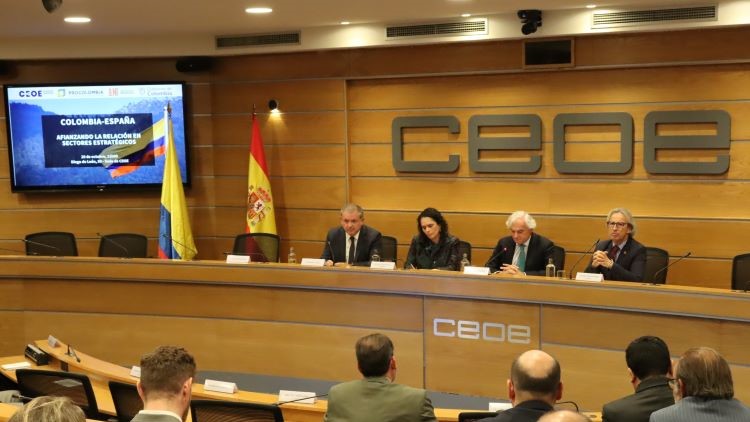Eduardo González
The Vice Minister of Infrastructure of Colombia, María Constanza García, yesterday invited Spanish companies to get involved in the Intermodal Transport Master Plan (PMTI), the roadmap established by the Government of Bogotá for the definition of strategic integration projects for the territory. and strengthening the country’s competitiveness and intermodal connectivity for the next 20 years.
Constanza participated yesterday in the event Strengthening the relationship with Colombia in strategic sectors, organized by the CEOE and the ProColombia office in Spain and aimed at Spanish companies and institutions with interests and presence in the Colombian market to publicize projects of interest in key areas such as water and sanitation, construction of prisons, hospitals. educational centers and irrigation districts, among others.
According to the vice minister, there is a very important alliance and great collaboration in the field of infrastructure with Spanish companies. For this reason, she reported that, through the PMTI, the Government wants to promote intermodality in the country, and thanks to the Infrastructure Law, which has been in force for ten years and which promotes public-private alliances in projects, there are numerous opportunities in the sector. “It is important to generate long-term relationships, especially with Spain,” she stressed.
In the field of infrastructure, Constanza mentioned the improvement of roads in the country and the plans to improve the rail, air and port network, all within the framework of a sixth generation of projects that also aims to focus on development. social, through the construction of hospitals, aqueducts or schools.
In the opening session of the day, the vice president of CEOE, Miguel Garrido, highlighted that Colombia is the fourth largest economy in the region, after Brazil, Mexico and Argentina, and that Spain is “the second investor there and a partner strategic”. “There are more than 800 Spanish companies present in various sectors, which have become Colombian companies,” he stressed.
For his part, the general director of CEOE International and permanent secretary of the Council of Ibero-American Entrepreneurs (CEIB), Narciso Casado, highlighted the upcoming celebration, on December 11 and 12, of the VI Ibero-American Forum of MSMEs in Medellín, an activity joint CEIB, SEGIB and ProColombia in which authorities, institutions, business organizations, multilateral organizations and experts from across the region will identify common priorities and opportunities, draw up frameworks for action, share good practices and reinforce the will to forge the best possible future for Iberoamerica.
“It is crucial to strengthen our relationships in infrastructure and transportation, which is why a memorandum of understanding was signed in May 2023, to collaborate intensely in this sector and to be able to continue growing together,” declared, for his part, the Colombian ambassador to Spain. Eduardo Avila. “The Government of Change,” he added, is committed to a transformation of infrastructure to boost competitiveness and wants to take advantage of Colombia’s geopolitical position to do so, he added.
Likewise, he announced the reforms that are going to be carried out in the country’s railway network, reported the intention to recover the navigability of the river network and highlighted the importance of promoting tourism and promoting air services to promote competitiveness. “It is important to have a modern transportation infrastructure, very much in line with sustainable development and that seeks to have a social impact,” declared Ávila.
The PMTI will benefit 294 municipalities through 86 railway, river, air and road projects, for an estimated value of 48 billion dollars. According to the World Bank, Colombia is the third most efficient country for infrastructure development. Furthermore, according to the CEOE, the country has a regulatory framework with international standards and robust institutions, which facilitates and protects foreign investment, free enterprise and private initiative.







